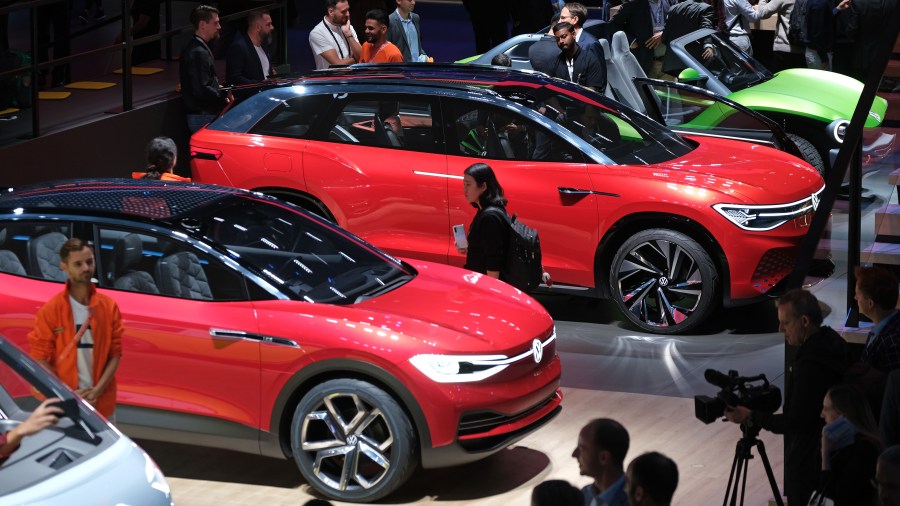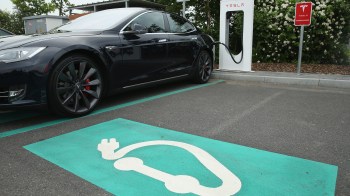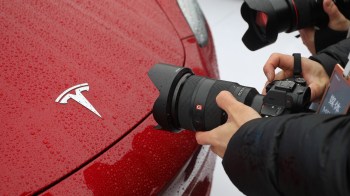Drivers wanted: EVs are all over the Frankfurt Motor Show

The Frankfurt Motor Show opened this week in Germany, and automakers are showcasing their hot, new electric vehicles. As always, prices for many of the electric cars run well above the means of a humble public radio employee. You’ve got your Porsche, your Mercedes-Benz, your BMW. But in Europe, there are also a lot of other offerings with prices closer to the range of what the average consumer could buy.
That’s what struck Marketplace’s Jack Stewart. He covers transportation, so I asked him about how EVs are being pitched and purchased this year in the U.S. and abroad. The following is an edited transcript of our conversation.
Jack Stewart: I think we’re really seeing this tipping point now where the automakers are showing some, at least on concept form, some compelling electric vehicles, but a lot of them in real form as well — cars that you can go out and buy. The Volkswagen ID.3, this is Volkswagen’s new car for the people. This could be as important to the company as the Golf, or what you guys used to call the Rabbit here in the U.S., or as important as the Beetle, maybe. This is their car for everyone. This is their affordable car.
Jed Kim: What’s the price point we’re talking about?
Stewart: Starting mid-$30,000. They’re not actually going to sell that one in the U.S. We’re only going to get the bigger ones; we get the SUVs. They think that we only like large vehicles here, which is somewhat true. But for the rest of the world, this is what we’re going to see: smaller electric cars just beginning to penetrate the market properly.
Kim: To some degree, I’m not surprised that electric vehicles would make such a big presence at a European auto show. In the U.S., what might keep customers going for that EV?
I think that if you started to show some of these compelling vehicles … in the U.S., then maybe they would catch on a little bit faster.
Jack Stewart
Stewart: It’s funny that you’re not surprised you see them at a European show. I think all the shows have their own personality. You have the Paris auto show, and it’s like, “Look, it’s my quirky car. It’s so cool. Look at the design.” And you have the Geneva auto show, and it’s all about super-cars and high-end, massive, expensive, high-performance vehicles. Frankfurt is about technology — green technology. So it’s not a surprise we’re seeing these vehicles in Frankfurt. We’re not going to see the same sort of vehicles at the Detroit auto show, which is about trucks and SUVs and muscle cars. I personally think that’s a bit of a shame. I think that if you started to show some of these compelling vehicles and their fun designs and some of the advantages of EVs in the U.S., then maybe they would catch on a little bit faster.
Kim: So besides getting people to think and dream of driving electric here, what other hurdles are keeping people from adopting them widely?
Stewart: I think a lot of it is perception. We’re in California right now, so we have a different perception of EVs because we see them on the streets quite a lot then somebody living in town in the middle of the country without a great charging infrastructure might have. If you’re not seeing these other cars on the road, if you’re not seeing a bunch of chargers everywhere that you go and realizing that it’s pretty easy to charge something up, then I don’t know why it would necessarily be on your shopping list to buy an EV.
Kim: This show is happening at the middle of a trade war between the U.S. and China, and Britain still headed for Brexit. Is the car industry susceptible to these tensions?
Stewart: Very much so. The car industry is global and wants to be even more global. If you’re one of these companies building these very expensive vehicles to develop, that take years to develop, you want certainty into the future about what’s going to happen. You want to know what type of environment you’re going to be selling into in terms of regulations, environmental and emissions, but also trade and sourcing of parts. The global supply chain for a vehicle now is global. It’s almost impossible to break it down by country. It’s hard. These automakers are having to deal with that on top of all these other uncertainties about who wants to buy these cars, whether they’re building the right thing for the future.

Related links: more insight from Jed Kim
As we heard from Stewart, carmakers are offering more affordable electric vehicles, but they’re still worried people won’t buy them. The Wall Street Journal said that’s why automakers are using the Frankfurt stage to tell governments they need help by way of tax subsidies and other incentives. Even in Europe, which has some of the toughest emissions restrictions, EV sales for the first half of this year only made up 2.4% of vehicles sold in the European Union.
If you want to see some of the cars on display at the Frankfurt show, CNET has a list of them. You can see the Hyundai 45 that Stewart’s salivating over. It is retro — an homage to the first car the company introduced 45 years ago. I think it looks like something Robocop would drive. Korean Robocop — I’d watch that.
I just learned that if you Google “Korean Robocop,” you get a commercial of the cyborg protector shilling fried chicken in Korean. I don’t know what’s happening.
Finally, big developments for drivers, at least gig economy drivers. California lawmakers have voted to force app-based companies to treat their contract workers like employees. If signed by Gov. Gavin Newsom, Assembly Bill 5 will have a huge impact on Uber and Lyft, which will have to provide benefits. Molly Wood spoke about this recently with Marketplace reporter Meghan McCarty Carino. It’s estimated the annual cost to Uber will be $500 million, $290 million to Lyft. Uber says it believes the new law leaves room for it to keep operating the same way. Still, that company, Lyft and DoorDash have already pooled $90 million to launch a campaign to create a new classification of workers. They want to take it to California voters next year.
The future of this podcast starts with you.
Every day, the “Marketplace Tech” team demystifies the digital economy with stories that explore more than just Big Tech. We’re committed to covering topics that matter to you and the world around us, diving deep into how technology intersects with climate change, inequity, and disinformation.
As part of a nonprofit newsroom, we’re counting on listeners like you to keep this public service paywall-free and available to all.
Support “Marketplace Tech” in any amount today and become a partner in our mission.






















